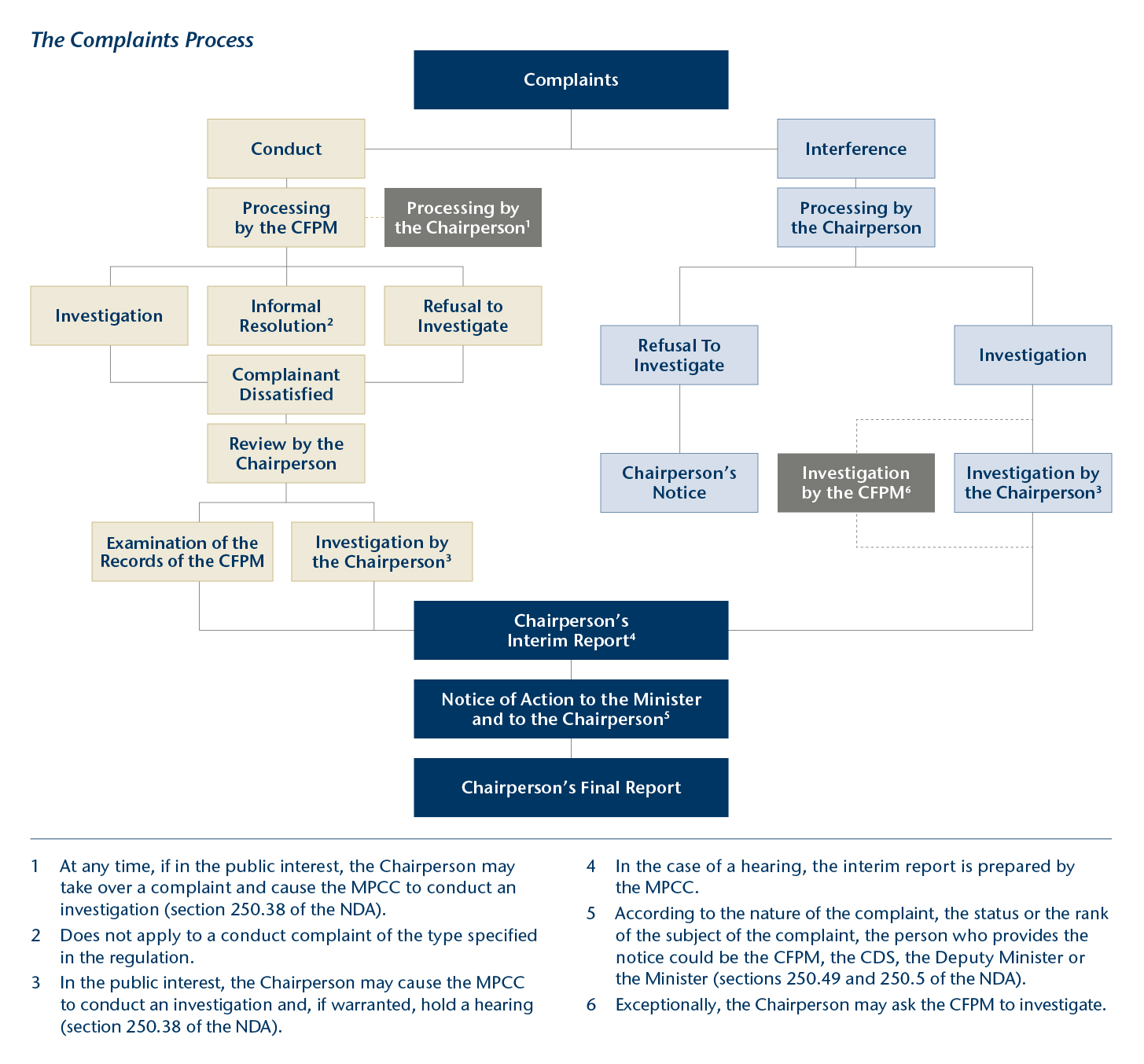2020 Annual Report | A new era: managing through uncertainty
NOTE: Please be advised that although the fax number remains in previously published documents, our fax line is no longer in service.
© Her Majesty the Queen in Right of Canada, represented by the Military Police Complaints Commission of Canada, 2021.
Catalogue No. DP1 | ISSN 1700‑6627
Table of Contents
- Letter of Transmission to the Minister
- Chairperson's Message
- Part 1 – Overview
- Military Police Complaints Commission of Canada
- Mandate and Mission
- Organizational Background
- The Canadian Forces Provost Marshal and the Deputy Commander, Canadian Forces Military Police Group/Professional Standards
- The Military Police
- Conduct Complaints Process
- Interference Complaints Process
- Public Interest Investigations and Hearings
- Part 2 – The Year in Review
- Monitoring and Investigations
- Public Interest Investigation into Anonymous Complaint (Treatment of Detainees)
- Public Interest Investigation into a Historical Complaint Alleging Torture and Abuse of Former Canadian Armed Forces Members during their Training
- Registrar Public Interest Investigation
- Impact on Military Policing – Case Summaries
- Outreach
- Collaboration
- Coronavirus Pandemic and the Military Police Complaints Commission of Canada
- Part 3 – Stewardship Excellence
- Part 4 – Conclusion
Letter of Transmission to the Minister
March 29, 2021
The Honourable Harjit Sajjan, P.C., M.P.
Minister of National Defence
National Defence Headquarters
Major-General George R. Pearkes Building
Ottawa, Ontario K1A 0K2
Dear Minister:
In accordance with subsection 250.17(1) of the National Defence Act, it is my duty and privilege to submit, for tabling in Parliament, the Military Police Complaints Commission of Canada's 2020 Annual Report.
In this annual report, you will find a detailed discussion of all significant aspects of the Military Police Complaints Commission of Canada’s activities during 2020, including summaries of some of its reviews and investigations of complaints.
All of which is respectfully submitted.
Yours truly,
Original signed by
Hilary C. McCormack, LL.B.
Fellow Litigation Counsel of America
Chairperson
Chairperson’s Message

Only one year ago, I reported with optimism on the 20th anniversary symposium of the Military Police Complaints Commission of Canada (MPCC) and our plans for this and future years as our organization entered its third decade.
That optimism has been tempered by events none of us could possibly have anticipated. The Coronavirus (COVID‑19) pandemic and social unrest about police and citizen interactions have created extreme anxiety in societies across the globe and mounting pressures on our health care systems and economies. Nothing like this has been seen since the Spanish Flu pandemic over 100 years ago and the two major World Wars. These are unprecedented times. Our challenge is to remain relevant in the face of the unexpected, giving rise to this year’s theme – A NEW ERA: MANAGING THROUGH UNCERTAINTY.
The MPCC came into being as an independent oversight body in December 1999 through amendments to the National Defence Act incorporating recommendations emanating from major comprehensive reviews advocating for greater accountability in Canada’s military justice system. The MPCC continues to work rigorously to incorporate the recommendations of all such reviews into its mandate to investigate and report on any complaints about Military Police actions and to protect military police independence through the investigation of interference complaints raised by military police members.
Last year, I underscored the need for cultural adaptation among police services in an increasingly complex operating environment. That need is now even more important. A growing crisis of confidence in policing is keenly observable in the United States, but let us not assume it is not here as well. Although the confidence crisis relates mostly to civilian policing, there are strong messages for military police as well.
A huge change has taken place in the recognition of police authority. There is a large and justifiable pushback against abuse. We need not repeat the details of shocking events in Minneapolis and other American cities, but Canada is not immune to racial profiling and other abusive behaviours. It is regrettable that statistics point to the stark overrepresentation of Indigenous and Black Canadians among the victims of police abuse. That is not the standard of conduct that Canadians expect of Canadian police.
Social movements arising from citizen pushback against the overuse of force by police have taken foothold across North America. Black Lives Matter has mobilized millions of citizens and given them a powerful voice to speak out against systemic racism and abuse and demand an end to discrimination. Calls for the “defunding” of police must be taken in context. This is essentially redirecting budgets away from patrolling the streets and other typical police activities and toward community housing and similar municipal government functions. While seen as radical on the surface, this really means realigning police services to better serve with community needs.
These and other movements bring into focus a need for greater citizen engagement in governance structures, police services being one example. In a climate of uncertainty and political unrest, the transformation of police services is a major focus of citizens calling for equality and justice.
Even before these emerging social concerns, policing has been evolving quickly. Digital technologies, street cameras and social networking are part of the present and future. Accountability is demanded at all levels and is one way to improve public confidence in policing.
All of this has been taking place against the backdrop of the pandemic. COVID‑19 may persist well into 2021. It has forced us to rethink and adapt our social lives, shopping patterns and workplaces. The digital office, only recently just an idea, has become routine. Remote learning and telework are part of today’s reality and will stay as the future continues to unwind.
In a society traditionally resistant to change, the pandemic has forced organizations and citizens to innovate and embrace new approaches. We are becoming more adaptable out of necessity and must continue to seek innovative solutions to emerging issues. For our police services, this means being open to adaptive solutions to remain relevant and current.
In this new era, the doors are wide open to greater citizen engagement. Governments at all levels, including police services, must find ways to empower their citizens to participate in collective problem solving. Jocelyne Bourgon, a former Clerk of the Privy Council, wrote in the Ottawa Citizen that one lesson of the pandemic is that “Governing is a search for balance. The magic does not reside in the efficiency of the parts but in the capacity to align the contribution of the public, private and civic spheres of life to propel society forward.” This transformational change means that policing needs to be more flexible and adaptive to respond to public pressures. In a diverse and inclusive society, police services must listen to and work with the communities they serve.
I believe that we at the MPCC have demonstrated success in many of the areas I have identified above. Our organization responded quickly to pandemic-driven changes. Our business is largely conducted digitally, with widespread telework and the use of internet-based tools for collaboration, virtual meetings and even virtual outreach activities. The MPCC has emphasized employee mental wellness and safety during the pandemic. We are proud of the diversity and inclusiveness of our workforce, which has been created through conscious decisions over recent years. I can say with confidence that our statistics are well above the Public Service average. Through continual relationship building, the MPCC continues to enjoy collaborative relationships at several levels: the Chair and the Canadian Forces Provost Marshal; the Chair and the Judge Advocate General; our Senior General Counsel and Director General with the Deputy Commander Canadian Forces Military Police Group; and MPCC legal and Registry staff with the Professional Standards Staff of the Military Police Group. We are consciously striving to maintain open and productive relationships in our interactions. Within the MPCC, I remain grateful to our Commission Members and staff for their unswerving support.
At all levels we must be adaptive, inclusive and responsive. The MPCC has responded quickly to the new world reality and is prepared to stay the course in these uncertain times. I believe that Canada’s Military Police are equipped and prepared to do the same.
Original signed by
Hilary C. McCormack, LL.B.
Fellow Litigation Counsel of America
Chairperson
Part 1 – Overview
I – Military Police Complaints Commission of Canada
The MPCC was established on December 1, 1999 by the Government of Canada to provide independent civilian oversight of the Canadian Forces Military Police. This was achieved through an amendment to the National Defence Act (NDA) creating a new Part IV, which sets out the mandate of the MPCC and how complaints are to be handled. As stated in Issue Paper No. 8, which accompanied the Bill that created the MPCC, its role is “… to provide for greater public accountability by the military police and the chain of command in relation to military police investigations.”
II – Mandate and Mission
Mandate: The MPCC reviews and investigates complaints concerning Military Police conduct and investigates allegations of interference in Military Police investigations. The MPCC reports its findings and makes recommendations directly to the Military Police and National Defence leadership.
Mission: To promote and ensure the highest standards of conduct of Military Police in the performance of policing duties and to discourage interference in any Military Police investigation.
The MPCC fulfils its mandate and mission by exercising the following responsibilities:
- Monitoring investigations conducted by the Canadian Forces Provost Marshal (CFPM) of Military Police conduct complaints;
- Reviewing the disposition of conduct complaints about Military Police members at the request of the complainant;
- Investigating complaints of interference made by Military Police members; and
- Conducting public interest investigations and hearings.
III – Organizational Background
The MPCC is one of 8 organizations in the Defence Portfolio. While it reports to Parliament through the Minister of National Defence (MND), the MPCC is both administratively and legally independent from the Department of National Defence (DND) and the Canadian Armed Forces (CAF). The MPCC is not subject to direction from the MND in respect of its operational mandate.
The MPCC is an independent federal government institution as defined under Schedule I.1 of the Financial Administration Act (FAA). As an independent oversight agency, the MPCC must operate at a distance and with a degree of autonomy from government, including the DND and the CAF. The MPCC Commission Members and employees are civilians and are independent of the DND and the CAF in fulfilling their responsibilities and accountabilities in accordance with governing legislation, regulations and policies.
Tribunal decisions and MPCC operations and administration must also be, and be seen to be, free from ministerial influence, other than seeking the signature of the MND as the Minister responsible for routine tabling of the MPCC’s Departmental Results Reports, Departmental Reports, Annual Reports to Parliament, and other accountability documents such as Memoranda to Cabinet and Treasury Board submissions.
The Chairperson, as Chief Executive Officer (CEO) of the MPCC, is accountable for all MPCC activities and for the achievement of results. Based on the Terms and Conditions of Employment for Full-Time Governor in Council Appointees, the Chairperson is CEO, statutory deputy head or Deputy Head, as defined by the FAA and as designated through the Governor in Council.
As Deputy Head, the Chairperson is accountable to Parliament for fulfilling management responsibilities, including financial management. This includes accountability for allocating resources to deliver MPCC programs and services in compliance with governing legislation, regulations and policies; exercising authority for human resources as delegated by the Public Service Commission; maintaining effective systems of internal controls; signing accounts in a manner that accurately reflects the financial position of the MPCC and exercising any and all other duties prescribed by legislation, regulations or policies relating to the administration of the MPCC.
IV – The Canadian Forces Provost Marshal and the Deputy Commander, Canadian Forces Military Police Group/Professional Standards
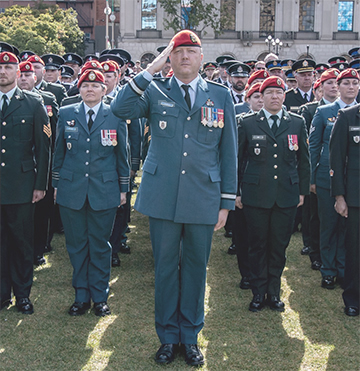
On April 1, 2011, the CFPM assumed full command of all Military Police members who are directly involved in policing. The CFPM also assigns Military Police resources to other supported commanders under operational command.
The Deputy Commander of the Canadian Forces Military Police Group (CF MP Gp) manages public complaints and internal military police misconduct investigations and ensures adherence to the Military Police Professional Code of Conduct.
The CFPM is the first to respond to complaints about Military Police conduct. The MPCC has the authority to monitor the actions taken by the CFPM as it responds to complaints, and to conduct its own reviews and investigations as required. The MPCC has the exclusive authority to deal with interference complaints.
The MPCC’s recommendations, contained in its Interim and Final Reports, are not binding on the CAF and the DND. However, such recommendations do provide the Military Police with the opportunity to improve its operations and further enhance transparency and accountability.
Detailed information about the conduct and interference complaints processes are set out in sub-sections vi) and vii).
V – The Military Police
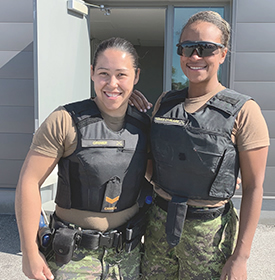
The CAF Military Police Branch was formed in 1968 with the unification of the CAF. Military Police members were allocated to the Army, Navy and Air Force. The stated Mission of the CAF Military Police is to contribute to the effectiveness and readiness of the CAF and the DND through the provision of professional police, security and operational support services worldwide.
The Military Police Branch is comprised of 2,061 personnel: 437 reservists and 1,624 regular force who are sworn, credentialed members (officers and noncommissioned members). Credentialed members are those members who are entitled to be in possession of a Military Police member badge and identification card and thus are peace officers by virtue of article 22.02 of the Queen’s Regulations and Orders, section 156 of the NDA and section 2 of the Criminal Code.
The Military Police exercise jurisdiction within the CAF over both DND employees and civilians on DND property. The Military Police form an integral part of the military justice system in much the same way as civilian police act within the civilian criminal justice system. Military Police routinely train and work with their civilian counterparts in the provision of police and security services to the CAF and the DND.
Members of the Military Police are granted certain powers under the NDA in order to fulfill their policing duties. For example, Military Police members have the power to arrest, detain and search. The Criminal Code recognizes members of the Military Police as peace officers. Therefore, they can make arrests and lay charges in civilian criminal courts. Additionally, Military Police members posted to the Canadian Forces National Investigation Service (CFNIS) can also lay charges under the NDA's Code of Service Discipline.
Military Police 80th Anniversary
We would be remiss if we did not acknowledge that the year 2020 marked the 80th anniversary of the genesis of the modern Canadian Military Police.
While the military policing function has been part of Canada’s military heritage going back to early colonial times, the first nationally organized Military Police structure within the Canadian military was created in 1917 during World War I. Members of what was then known as the Canadian Military Police Corps (CMPC) served with considerable distinction during very challenging operations both overseas and domestically. The CMPC was, however, largely disbanded in the 1920s, following the end of the war.
After the outbreak of World War II, the Canadian military established the Canadian Provost Corps on June 15, 1940. Initially comprised of members of the Royal Canadian Mounted Police (RCMP), the Provost Corps soon recruited qualified applicants from the Army, particularly those with civilian police experience. The Provost Corps provided a full spectrum of military policing to the Canadian Army during and after the war. The Canadian Provost Corps became the basis of unified, inter-service Military Police trade established in the 1960s. The current Military Police trace their beginning to the establishment of the Provost Corps in 1940.
In the intervening 80 years, the Canadian Military Police has contributed to Canadian military missions of a combat, peacekeeping and humanitarian nature, at locations throughout the world. Their unique training and skill set has served Canadians by providing military force security, supporting field operations, enforcing military discipline and upholding the rule of law. They continue to carry out these important duties every day, and we salute them for this. In acknowledging and applauding the proud history of the Canadian Military Police, we at the MPCC take renewed inspiration and commitment to our own mandate of helping to support public confidence in military policing through independent oversight.
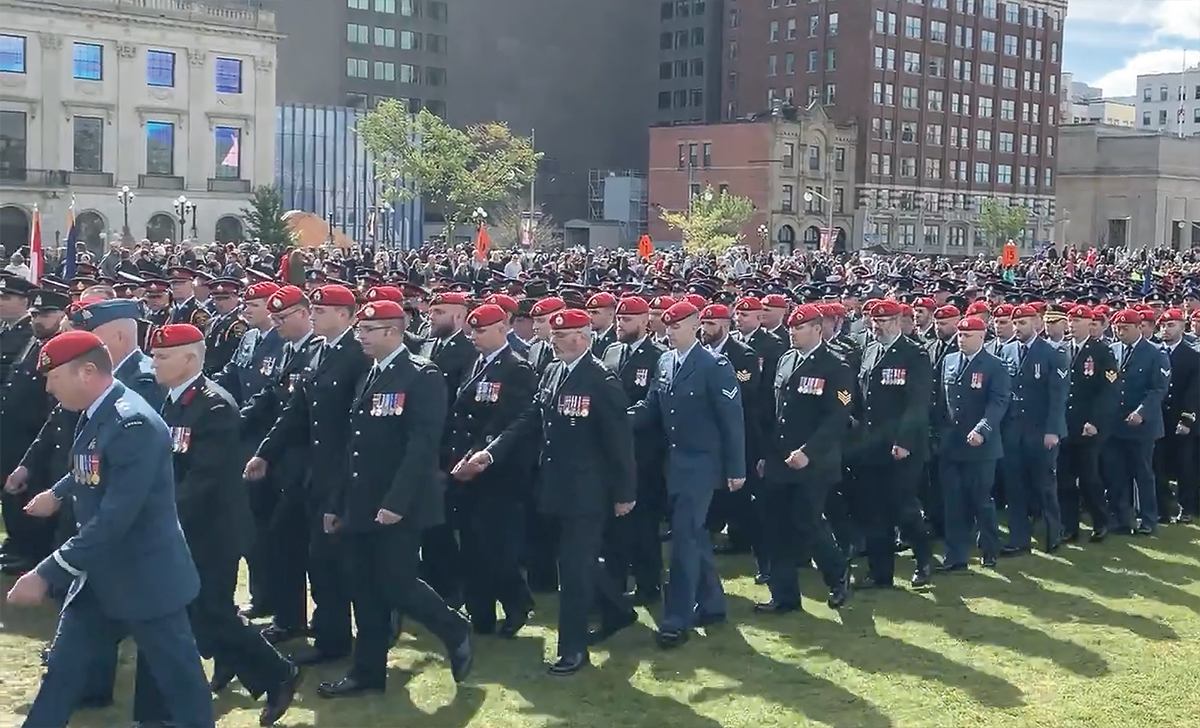
VI – Conduct Complaints Process
Conduct Complaint Filed
Anyone may make a conduct complaint regarding the Military Police in the performance of their policing duties or functions, including individuals not directly affected by the subject matter of the complaint. Such complaints are initially dealt with by the CFPM. Informal resolution is encouraged.
Complaint Investigated by the CFPM
As the CFPM investigates a complaint, the MPCC monitors the process. At the conclusion of the investigation, the CFPM provides a copy of its final disposition of the complaint to the MPCC. The MPCC may, at any time during the CFPM investigation, assume responsibility for the investigation or call a public hearing if it is deemed to be in the public interest .
Request for Review
Complainants may request the MPCC review the complaint if they are not satisfied with the results of the CFPM’s investigation or disposition of the complaint.
MPCC Reviews Complaint
This involves an examination of documentation compiled by the CFPM’s office during its investigation, as well as consideration of applicable legislation, and relevant military and civilian police policies and procedures. Depending on the case, the MPCC’s review may involve interviews with witnesses, including the complainant and the subject of the complaint.
MPCC Releases Interim Report
At the completion of the review, the Chairperson sends the Interim Report to the MND, the Chief of the Defence Staff (CDS) and the CFPM, setting out the MPCC's findings and recommendations regarding the complaint.
Notice of Action
The Notice of Action is the official response by the CFPM to the Interim Report. It outlines what action, if any, has been or will be taken in response to the MPCC’s recommendations.
MPCC Releases Final Report
After considering the Notice of Action, the MPCC issues a Final Report of findings and recommendations. The Final Report is provided to the MND, the Deputy Minister (DM), the CDS, the Judge Advocate General (JAG), the CFPM, the complainant(s) and the subject(s) of the complaint, as well as anyone who has satisfied the MPCC that they have a substantial and direct interest in the case.
How the MPCC Carries Out Its Reviews and Investigations of Conduct Complaints
In response to a request from a complainant for a review, the MPCC follows the steps described below:
- The MPCC conducts a preliminary review of the complaint and the related Military Police (MP) files and records, which the Canadian Forces Provost Marshal (CFPM) is obligated to provide, in order to determine how to respond to the request for review; including, whether an investigation is required, the scope of the investigation warranted and how to approach the investigation. The Chairperson may also delegate a Commission Member to handle the file.
- A lead investigator is assigned and, with MPCC legal counsel, reviews the evidence and other materials gathered during the CFPM's investigation of the complaint. This could be hundreds of pages of documents, emails, handwritten notes and reports, and many hours of witness audio and video recordings.
- The lead investigator, in consultation with the assigned legal counsel, prepares an Investigative Assessment (IA) for consideration and approval by the Chairperson or delegated Commission Member. The IA is a report summarizing all the available evidence, and identifying any further lines of inquiry which may be necessary in order to conclude the review of the complaint: further documents or records to be obtained; research on issues of law, MP policy or policing best practices; or witness interviews. Where further investigation is deemed appropriate, the IA will also include timeline and budget estimates which must also be approved.
- If the IA, as approved by the Chairperson or delegated Commission Member, indicates that there is sufficient information to decide the complaint, either with or without further records and/or research, the Chairperson or delegated Commission Member will proceed to prepare the Interim Report, containing the MPCC's findings and recommendations regarding the complaint.
- If the Chairperson or delegated Commission Member determines that witness interviews are required in order to decide the complaint, the assigned investigator(s) will proceed to conduct the interviews. The additional information obtained from these interviews will be summarized and added to the IA to produce an Investigation Assessment Report (IAR). Once the IAR is completed to the satisfaction of the Chairperson or delegated Commission Member, the MPCC will then proceed to the preparation of the Interim Report.
- As described in the previous section, the Interim Report is provided to the MND, the CDS and the CFPM for an official response in the form of a Notice of Action. The Notice of Action will be considered in the MPCC’s Final Report, which will be sent to the parties to the complaint, the relevant departmental officials, as well as anyone who has satisfied the MPCC that they have a substantial and direct interest in the case.
VII – Interference Complaints Process
Interference Complaint Filed
Any member of the Military Police who conducts or supervises investigations and believes a member of the CAF or a senior official of the DND has interfered with or attempted to influence a Military Police member investigation may file a complaint with the MPCC.
MPCC Investigates
The MPCC has sole jurisdiction to investigate interference complaints. A preliminary review is conducted to determine whether an investigation should be commenced, the scope of the investigation and how to approach the investigation. Once this process is complete, the MPCC begins its investigation.
MPCC Releases Interim Report
The Interim Report includes a summary of the MPCC’s investigation, as well as its findings and recommendations. This report is provided to the MND, the CDS, if the alleged interference was carried out by a member of the military, or to the Deputy Minister (DM) of National Defence, if the subject of the complaint is a senior official of the DND; and to the JAG and the CFPM.
Notice of Action
The Notice of Action is the official response to the Interim Report. It indicates the actions, if any, which have been or will be taken to implement the MPCC’s recommendations.
MPCC Releases Final Report
Taking into account the response set out in the Notice of Action, the MPCC prepares a Final Report of its findings and recommendations in the case. The Final Report is provided to the MND, the DM, the CDS, the JAG, the CFPM, the complainant(s), and the subject(s) of the complaint, as well as anyone who has satisfied the MPCC that they have a substantial and direct interest in the case.
VIII – Public Interest Investigations and Hearings
At any time, if it is in the public interest, the Chairperson may initiate an investigation into a complaint about police conduct or interference in a police investigation. If warranted, the Chairperson may decide to hold a public interest hearing. In exercising this statutory discretion, the Chairperson considers a number of factors including:
- Does the complaint involve allegations of serious misconduct?
- Do the issues have the potential to affect confidence in the Military Police or the complaints process?
- Does the complaint involve or raise questions about the integrity of senior military or DND officials, including senior Military Police members?
- Are the issues involved likely to have a significant impact on Military Police practices and procedures?
- Are the issues of broader public concern or importance?
Alternate format
The image illustrates the Military Policy Complaints Commission of Canada's (MPCC) complaints process which explains the two processes, namely the conduct complaint and the interference complaint.
- Conduct Complaint
- Processing by the CFPM
- Investigation
- Complainant Dissatisfied
- Informal Resolution (does not apply to a conduct complaint of the type specified in the regulation)
- Refusal to Investigate
- Complainant Dissatisfied
- Investigation
- Processing by the Chairperson (at any time, if in the public interest, the Chairperson may take over a complaint and cause the MPCC to conduct an investigation (section 250.38 of the NDA))
- Complainant Dissatisfied
- Review by Chairperson
- Examination of the records of the CFPM
- Investigation by the Chairperson (in the public interest, the Chairperson may cause the Complaints Commission to conduct an investigation and, if warranted, hold a hearing (section 250.38 of the NDA))
- Review by Chairperson
- Chairperson's Interim Report (in the case of a hearing, the interim report is prepared by the MPCC)
- Notice of Action to the Minister and to the Chairperson (according to the nature of the complaint, the status or the rank of the subject of the complaint, the person who provides the notice could be the CFPM, the Chief of the Defence Staff, the Deputy Minister or the Minister (sections 250.49 and 250.5 of the NDA))
- Chairperson's Final Report
- Processing by the CFPM
- Interference Complaint
- Processing by the Chairperson (at any time, if in the public interest, the Chairperson may take over a complaint and cause the MPCC to conduct an investigation (section 250.38 of the NDA))
- Refusal to investigate
- Chairperson's Notice
- Investigation
- Investigation by the CFPM (exceptionally, the Chairperson may ask the CFPM to investigate)
- Investigation by the Chairperson (in the public interest, the Chairperson may cause the Complaints Commission to conduct an investigation and, if warranted, hold a hearing (section 250.38 of the NDA))
- Refusal to investigate
- Chairperson's Interim Report (in the case of a hearing, the interim report is prepared by the MPCC)
- Notice of Action to the Minister and to the Chairperson (according to the nature of the complaint, the status or the rank of the subject of the complaint, the person who provides the notice could be the CFPM, the Chief of the Defence Staff, the Deputy Minister or the Minister (sections 250.49 and 250.5 of the NDA))
- Chairperson's Final Report
- Processing by the Chairperson (at any time, if in the public interest, the Chairperson may take over a complaint and cause the MPCC to conduct an investigation (section 250.38 of the NDA))
Part 2 – The Year in Review
I – Monitoring and Investigations
The following table highlights the MPCC statistics on a four-year comparative basis from 2017 to 2020. The table cannot fully reflect the increase in the complexity and scope of the types of complaints the MPCC handles, nor accurately predict when complex complaints will be referred.
| Statistics | 2017 | 2018 | 2019 | 2020 |
|---|---|---|---|---|
| Conduct Complaints Carried Over | 36 | 53 | 37 | 28 |
| Interference Complaints Carried Over | 0 | 2 | 1 | 2 |
| Reviews Carried Over | 12 | 14 | 14 | 17 |
| s.250.38 Public Interest Investigations/Hearings Carried Over | 1 | 1 | 2 | 2 |
| Judicial Proceedings Carried Over (e.g. Judicial Review) | 0 | 1 | 1 | 0 |
| Other External Proceedings Carried Over | 0 | 0 | 0 | 0 |
| Total Files Carried Over | 49 | 71 | 55 | 49 |
| General Files Opened (Request for Information and Other) | 44 | 64 | 51 | 93 |
| New Conduct Complaints Note (A) | 63 | 37 | 47 | 41 |
| New Interference Complaints Note (A) | 2 | 0 | 4 | 1 |
| New Reviews | 12Note * | 9 | 9 | 5 |
| New s.250.38 Public Interest Investigations/Hearings | 0 | 1 | 0 | 1 |
| New Judicial Proceedings (e.g. Judicial Review) | 1 | 0 | 0 | 0 |
| New Other External Proceedings | 2 | 0 | 0 | 0 |
| Total New Files Opened | 124Note * | 111 | 111 |
141 |
| Total Files under review in the Year | 173Note * | 182 | 166 |
190 |
| Public Interest Decisions/Rulings Issued | 1 | 1 | 2 | 2 |
| Time Extension Decisions Issued (incl. Recon.) | 7 | 8 | 10 | 7 |
| Interim Reports Issued | 9 | 6 | 5 | 10 |
| Final Reports Issued Note (B) | 9 | 8 | 8 | 12 |
| Reports/Decisions/Rulings Issued | 26 | 23 | 25 | 31 |
| Recommendations on Final Reports | 11 |
5 | 5 | 10 |
| Percentage of Recommendations Accepted | 91% | 80% | 100% | 100% |
II – Public Interest Investigation into Anonymous Complaint (Treatment of Detainees)
On November 4, 2015, Chairperson Hilary McCormack decided that the MPCC would conduct a Public Interest Investigation (PII) into an anonymous complaint relating to the alleged mistreatment of detainees in Afghanistan by the Military Police. This is the MPCC’s 14th Public Interest Investigation, and the first to be launched based on allegations made in an anonymous complaint.
The complaint alleges that in December 2010 and January 2011, the Commanding Officer of the Military Police Company stationed at Kandahar Airfield, Afghanistan conducted exercises at the Detainee Transfer Facility in order to “terrorize” the detainees.
The complaint also alleges that the CFNIS failed to bring charges against the Military Police Commanding Officer following an investigation. The complainant alleges that no charges resulted from this and subsequent investigations by the Military Police chain of command.

The decision to conduct a PII into this complaint took into account the nature and seriousness of the allegations, the need for an independent, public and transparent investigation process, and the measures taken by the complainant to protect his or her identity. In 2016, the Chairperson co-delegated this file to Commission Member Michel Séguin, and together they are conducting the investigation and will prepare the Interim and Final Reports.
Following considerable delays in the receipt of requested materials from the CFPM (in part attributable to a CFNIS decision to revisit the investigation), the MPCC received more than 3,000 pages of documentation in the summer and fall of 2016.
On February 27, 2017, the MPCC issued a decision regarding the scope of the PII and identified the subjects of the complaint. For reasons elaborated in earlier reports, the MPCC found that it did not have jurisdiction to investigate the aspects of the complaint relating to the conduct of the Military Police members involved in military operations, including the treatment of detainees, and that the administrative nature of an investigation by the Military Police’s chain of command, also fell outside its jurisdiction. Nonetheless, the conduct of the 2011 CFNIS investigation and the CFNIS’ decision not to lay charges following that investigation were found to be within the MPCC’s jurisdiction to investigate. As a result, it was decided that the PII would focus on the conduct of the CFNIS members involved in the 2011 investigation and decision not to lay charges.
The MPCC investigation proceeded with six subjects of the complaint. An investigation plan was prepared and the MPCC requested the assistance of the CFPM in order to access records held by the Canadian Joint Operations Command (CJOC) that could contain relevant documents for the PII.
Between July 2017 and September 2018, the MPCC investigators travelled throughout the country to meet and interview over 65 witnesses. The investigators then interviewed the six subjects of the complaint from October to December 2018. In 2018, the MPCC team also inspected hundreds of boxes of records held by CJOC. Documents relevant to the PII were identified, and copies were obtained.
In December 2018, the investigators began to review the evidence gathered during the PII and to prepare their Investigation Report. An additional witness interview was conducted in May 2019 to clarify information received during the investigation. The Investigation Report was submitted to the Commission Panel in July 2019.
After reviewing the Investigation Report, the Commission requested supplementary information. The information was compiled by the MPCC team and provided to the Panel in September and October 2019. Following the review of this information, the Panel has begun to prepare the MPCC’s Interim Report outlining their findings and recommendations with respect to the complaint. Between February and October 2020, numerous requests for additional disclosure were transmitted to the CFPM, and the MPCC has received and reviewed these additional materials. Additional interviews were also conducted between March and September 2020 with three witnesses, three subjects of the complaint, and two Security and Military Police Information System (SAMPIS) experts. These additional requests for disclosure and interviews were conducted in order to clarify information received during the PII and necessary to the preparation of the Interim Report. The Panel continues the preparation of this report.
III – Public Interest Investigation into a historical complaint alleging torture and abuse of former Canadian Armed Forces members during their training
In December 2016, the MPCC received a complaint from Mr. Jeffrey Beamish, a former CAF member. The complaint related to a 2015‑16 CFNIS investigation into alleged torture during training exercises that occurred at the Infantry Battle School at Canadian Forces Base (CFB) Wainwright between October 1983 and March 1984. The complaint alleged, in essence, that a group of over 30 recruits were subjected to inhumane and emotionally damaging conditions during a Prisoner of War scenario.
Mr. Beamish maintains that this treatment ultimately caused him significant mental health problems in the form of major depressive disorder, post-traumatic stress disorder, night terrors, paranoia and adjustment issues.
Mr. Beamish made a complaint with the CFNIS about these events. In August 2016, the CFNIS member in charge of conducting the investigation called Mr. Beamish to advise him that the investigation was closed. Mr. Beamish subsequently filed his complaint with the MPCC, alleging that the CFNIS investigator failed to investigate serious criminal matters and that this constituted professional negligence and incompetence.
The MPCC sent the complaint to the CF MP Gp Professional Standards (PS) Section for investigation, in accordance with the process set out in the NDA.
On September 20, 2017, the PS Section concluded its investigation, finding all allegations to be unsubstantiated. On September 26, 2017, Mr. Beamish submitted a request to the MPCC for a review of the complaint.
The MPCC received disclosure of the investigative files and related interview recordings in November 2017. Having reviewed these materials, the MPCC Chairperson, Hilary McCormack, decided to exercise her discretion to conduct a PII into this matter. On April 11, 2018, the Chairperson decided that the MPCC would conduct a PII into a complaint that alleges a historical incident of torture and abuse of former CAF members during their basic infantry training in the winter of 1984. This is the MPCC’s 15th PII.
The Chairperson noted that an allegation that the CFNIS failed to investigate serious criminal allegations involving the military chain of command can impact on confidence in the Military Police and the perception of their independence, which in turn, heightens the need for an open and transparent investigation to be conducted by an independent agency. The Chairperson further noted that this complaint raises systemic issues related to the respective roles and responsibilities of the police and prosecutors in making decisions regarding the pursuit of investigations and the laying of charges.
Beginning in October 2018 and throughout 2019 and early 2020, numerous requests for additional disclosure were transmitted to the CFPM, and the MPCC has been receiving and reviewing additional materials.
After careful review of the disclosed CFNIS and PS file materials, the MPCC investigators prepared a detailed Investigative Assessment and Plan. This document was reviewed by the Chairperson in September 2018, and the witness interviews began in November 2018. Since then, the MPCC investigators traveled throughout the country and have interviewed 40 witnesses. New witnesses were identified as the investigation progressed.
In mid-March 2020, with the implementation of emergency measures in response to the COVID‑19 pandemic, some in-person witness interviews had to be rescheduled, due to restrictions on travel and on interpersonal contact. Other interviews proceeded by telephone. The emergency situation also slowed the processing of disclosure requests.
In late May 2020, in-person witness interviews were resumed, with appropriate safety precautions in place. The last witness interview took place by telephone on October 6, 2020.
In November 2020, the Chair began her review of the investigators’ Investigative Assessment Report, which incorporated all the witness evidence as well as documentary and other records.
IV – Registrar Public Interest Investigation
On October 20, 2020, Chairperson Hilary McCormack decided that the MPCC would conduct a PII into a complaint concerning the actions of the Military Police Kingston Detachment in relation to Military Police investigations involving Officer Cadets at the Royal Military College of Canada (RMC). This is the MPCC’s 16th PII, and the first to be launched concerning a complaint initiated by the MPCC itself.
In September 2020, the MPCC, through its Registrar, initiated a complaint that arose out of the interaction between two students at RMC. A female Officer Cadet (OCdt) from RMC came to the Military Police Kingston Detachment to allege that she was being harassed by a male OCdt. She told the Military Police that she believed the male OCdt suffered from a mental illness and posed a danger to her.
The male OCdt subsequently came to the Military Police Kingston Detachment to complain that he had given money to the female OCdt with the expectation that a romantic relationship would develop but this had not happened. The Military Police informed him that he would probably be charged with the offence of soliciting a sexual service. Six days after his interview with the Military Police, the male OCdt attempted suicide. After a second suicide attempt in hospital, the male OCdt was put on life support, however, he has since been discharged but remains medically compromised.
In a subsequent interview with the female OCdt, the Military Police informed her that she should herself answer to a number of criminal charges, including sexual offences. She was not charged, but later made it clear she felt she was being blamed for the situation with the male OCdt.
The Chairperson has concluded that it is in the public interest that the MPCC conduct a PII. The public interest considerations present in this case include the systemic issues raised around suicide and the safety of complainants, the seriousness of the questions concerning criminal harassment and sexual offences investigations, the potential of discouraging potential victims or complainants from coming forward and the risk of potential negative perceptions that may have an impact on confidence in the Military Police.
Consequently, the Chairperson has determined that the PII in this matter will investigate whether the Military Police members who came into contact with a member of the Canadian Armed Forces who was suffering from a mental illness took reasonable steps in the circumstances to address the situation. This PII will also look into whether Military Police members who received an allegation and evidence concerning a situation that appeared to amount to criminal harassment conducted a reasonable investigation into the matter.
Further issues to be addressed in a PII are whether Military Police members who were told by a complainant that she feared for her safety from a man harassing her took reasonable steps in the circumstances and whether the investigation into sexual offences allegedly committed by the female OCdt was reasonably conceived and carried out. Finally, a PII will probe whether there was adequate oversight in this matter provided by supervisory Military Police members.
There are five subjects of this PII. Two of them were the front-line Military Police members who determined whether and how to proceed with criminal or other charges. The other three subjects were the supervisors of the two front-line members having command responsibility or being responsible for approving their investigation plans and the general direction of their activities in relation to the issues at RMC. Each of the subjects of the complaint will be provided an opportunity to participate in interviews with MPCC investigators in order to explain their role in conducting and/or supervising the various investigations concerning Officer Cadets at RMC.
V – Impact on Military Policing – Case Summaries
The section below summarizes selected conduct cases completed by the MPCC in 2020.
Conduct Case Summary MPCC‑2016‑029
Adequate Investigation Despite Withdrawal of Charges
The complainant, a retired CAF reservist, alleged that an investigation by the Military Police that led to criminal charges against him was conducted in a negligent manner. He also alleged that investigation and charge-laying protocols were not followed, search warrants were executed improperly, the investigation was not properly supervised, he was not informed that he was being investigated, he was not provided an opportunity to make a statement or provide exculpatory evidence, and he was improperly provided with sensitive information on an unrelated matter.
The conduct complaint was dealt with in the first instance by the Office of PS of the CFPM as per subsection 250.26(1) of the NDA. PS found the complaint to be unsubstantiated and the complainant subsequently referred it to the MPCC for review.
The MPCC found that the criminal investigation had been conducted in a reasonable manner and that the Military Police had brought their evidence to legal counsel to seek advice before charges were laid. The proper investigatory and charge-laying procedures were followed and the search warrants were executed properly. The MPCC also found that the investigation was properly supervised, and the complainant was provided an opportunity to make a statement or provide exculpatory evidence on a number of occasions. The MPCC found that the complainant was not informed of the investigation until the search warrants were executed which was appropriate in order to preserve evidence. These allegations by the complainant, therefore, were found to be unsubstantiated.
The MPCC found that the complainant was mistakenly provided with sensitive information on an unrelated matter as part of the disclosure provided to him concerning the charges laid against him. While this disclosure had no effect on the prosecution of the complainant and the allegation before the MPCC was found to be unsubstantiated, the MPCC made efforts to look at what policies and procedures are in place to try to prevent or at least minimize the inadvertent disclosure of materials from unrelated matters. It found that a new Military Police Order on this issue is in place. The MPCC recommended that the CFPM ensure that the Military Police follow the guidance provided by the new Military Police Order to prevent inadvertent disclosure.
In response to the MPCC’s Report, the CFPM accepted the MPCC’s findings and recommendation in this matter.
Conduct Case Summary MPCC‑2018‑010
Allegations of Bullying and Racial Discrimination Adequately Investigated
This conduct complaint concerned a Military Police investigation into an alleged incident of assault and harassment. The incident occurred in 2016 while the complainant served as part of the crew of a naval vessel.
The complainant had consumed a great deal of alcohol one evening and eventually lost consciousness. While he was unconscious, someone drew on his face. It is not known who did the drawing or the exact nature of its allegedly offensive content. At least one individual took a selfie with the complainant while he had the drawing on his face.
The complainant awoke in the Mess the following morning. A supervisor alerted him to the drawing on his face and told him to wash it off. The individual who took the selfie with the complainant had shown the photo to other members of the ship’s crew. A supervisor advised that individual to delete the photo from his phone, which he did.
In response to subsequent disciplinary actions taken against him, the complainant submitted to his Chain of Command a personal statement of concerns regarding the incident in which he relayed that he endured bullying and acts of racial discrimination.
Though initially satisfied with the actions taken by the Chain of Command to address the incident, in March 2017, the complainant sought the assistance of a Workplace Harassment Advisor who in turn contacted the Military Police to initiate a criminal/service offence investigation into alleged harassment experienced by the complainant. The Military Police investigation took place from March to May, 2017.
The Military Police investigator, who is the subject of the complaint to the MPCC, interviewed the complainant. He also interviewed three witnesses in relation to the incident that occurred in the Mess. The person alleged to have drawn on the complainant’s face declined the Military Police request to be interviewed.
In May 2017, the subject Military Police member concluded the investigation and did not recommend charges. He noted that while an impropriety occurred, it was minor in nature, there was no compelling evidence of discrimination against the complainant, and the Chain of Command had dealt appropriately with the matter. In an email to the complainant, the subject Military Police member informed him that due to a number of factors including several witnesses being unavailable or unwilling to speak with the Military Police, as well as a lack of physical evidence, he had not recommended charges and so closed the Military Police investigation.
The complainant took issue with this finding, believing that the Military Police investigation was closed without interviewing witnesses. He filed a grievance in September 2017. Since part of the complainant’s grievance dealt with conduct of an investigation by the Military Police, that portion was forwarded to the Office of Professional Standards of the CFPM.
In May 2018, the Office of PS of the CFPM concluded that the Military Police investigation was thorough, and no compelling evidence existed to support the complainant’s allegations concerning the subject Military Police member. In June 2018, the complainant sent a request for review to the MPCC.
The MPCC accepted the subject Military Police member’s determination that sufficient grounds and evidence to support a charge were lacking. However, the MPCC recommended that the subject Military Police member review the obligation to take detailed notes of investigative steps and document the decision-making process. The MPCC further recommended that Military Police members clearly communicate information about the investigation to complainants including the reasons for their conclusions.
In response to the MPCC’s report, the CFPM accepted the MPCC’s finding and recommendations in this matter.
Conduct Case Summary MPCC‑2018‑022
Proper Attention Paid to Driver Safety
The complainant alleged that, in the course of a routine traffic stop involving his daughter, a member of the Military Police gave no consideration to a course of action other than impounding the vehicle she was driving because its registration had expired. He also alleged that this Military Police member did not give due consideration to his daughter’s well-being, did not concern himself with how she could safely return to her home, and was rude and dismissive of everything she had to say. This rude and dismissive behaviour continued when his daughter later contacted the member at the military base where he worked. Another allegation was that when the complainant contacted the military base to attempt to resolve the matter informally, he was treated rudely and dismissively by the Military Police Detachment Warrant Officer with whom he spoke.
The conduct complaint was dealt with in the first instance by the Office of PS of the CFPM as per subsection 250.26(1) of the NDA. The Office of PS found the complaint to be unsubstantiated and the complainant subsequently referred it to the MPCC for review.
Upon receipt of the complaint, the MPCC requested disclosure of all relevant Military Police file materials from the CFPM. The MPCC conducted a detailed review of the materials received from the CFPM, in order to assess whether it needed to take additional investigative steps. The MPCC determined that further investigation was necessary, including interviews of the complainant and some witnesses.
The MPCC identified two subjects of the conduct complaint. At the time the complaint was submitted they were both Military Police members, serving in the Gagetown Detachment.
The MPCC found that the Military Police member at the traffic stop had the legal authority to impound the vehicle the complainant’s daughter was driving and there was no evidence that this was done improperly. The vehicle’s registration had expired and both a provincial traffic statute and Base Orders for CFB Gagetown required that the vehicle be removed from the road. The MPCC also found that the complainant’s daughter was not put in an unsafe position by the Military Police, was able to return to her home safely, and was not treated in a rude and dismissive manner. It was determined that the complainant’s daughter waited for a short period of time in a well-lit area near to some Military Police members before she was given a ride home by a work colleague. The MPCC further found that the complainant was not treated in a rude and dismissive manner when he contacted the Military Police Detachment Warrant Officer. All the allegations made by the complainant, therefore, were found to be unsubstantiated
The MPCC also made four recommendations. The first was that Military Police members become familiar with the vehicle registration procedures in their respective jurisdictions. The second was that the forms used when a vehicle is seized clearly show the legal authority under which a vehicle has been impounded. The third was that these forms also clearly indicate the location of a vehicle that has been impounded. The fourth was that Military Police members be reminded of the possibility that issues raised about the conduct of Military Police members can be resolved informally.
Conduct Case Summary MPCC‑2017‑026
Late Withdrawal of a Complaint Criticized
The complainant, a senior Army officer, was charged in 2015 in connection with a historical allegation of sexual misconduct with a former Army cadet. The charges included sexual exploitation, sexual interference, sexual assault and breach of trust. Following a preliminary inquiry in 2016, all the charges were withdrawn prior to trial.
The complainant filed this conduct complaint in 2017. The complaint alleged various errors and unfairness on the part of CFNIS investigators throughout the investigation, arrest and charging process. After an investigation, the Office of Professional Standards of the CFPM found all nine allegations of the complaint to be unsubstantiated. In July 2018, the complainant requested a review by the MPCC.
The complainant advised in March 2020, that he wished to withdraw this complaint. The MPCC Chairperson decided to accept this withdrawal; however, she also decided to issue a Letter of Observation.
The Letter of Observation noted that the lateness of the withdrawal in this case was unsatisfactory. Considerable time and effort had been devoted to the case, the withdrawal coming after the completion of witness interviews – essentially just prior to the drafting of the MPCC’s Interim Report. In its letter, the MPCC observed that, while it chose not to do so in this case, it retains the discretion to complete its review and issue an Interim and Final Report in future late withdrawal cases.
In its letter, the MPCC also commented on the substance of the complaint. The MPCC observed that, based on the available evidence, the CFNIS investigation seemed to have been generally well conducted. The MPCC also observed that the complainant had been fairly and well treated at the time of his arrest.
On the other hand, the MPCC observed that the CFNIS investigators may have acted with undue haste in terms of the timing and form of the complainant’s arrest. While the CFNIS had reasonable grounds to believe that an offence had been committed, the investigators neither sought an arrest warrant nor properly satisfied themselves that a warrantless arrest was necessary in the circumstances, as required by subsection 495(2) of the Criminal Code. The MPCC also noted that having sought the advice of the provincial prosecutors’ office regarding the appropriate charges, the CFNIS investigators could, and should, have waited the few more weeks it would have taken to receive the legal advice. This was a historical case where no current risks to other persons had been identified.
Conduct Case Summary MPCC‑2018‑030
Greater Help by Military Police Urged for Victim of Crime
This complaint arose from a historical sexual assault investigation. The complainant complained to the CFNIS that, as a young child, he was the victim of sexual abuse at the hands of a baby-sitter, an older child, when both were residents on a military base in the period of 1978‑80. The case was investigated and taken to a prosecutor; however, charges were not recommended. The CFNIS concluded the file without laying charges. The complainant filed a conduct complaint alleging that the CFNIS investigation was deficient.
In 2011, the complainant made an initial conduct complaint regarding the CFNIS handling of the case (MPCC 2011‑045). That complaint was not substantiated by the CFPM or by the MPCC.
In 2015, however, based on some new information recalled by the complainant, the CFNIS reopened their investigation into the complainant’s criminal allegations. Some additional records were obtained and reviewed and some additional witnesses were interviewed. However, the result was the same as the first investigation: no charges were laid.
The present complaint and review were limited to this second CFNIS investigation.
The Office of PS of the CFPM concluded that the CFNIS investigation had been properly done, and that the problem was the complainant’s apparent unwillingness to accept the results of the investigation.
Following its review of the significant amount of Military Police investigation file material, as well as voluminous information disclosed by the complainant, the MPCC concluded that the CFNIS investigation was not deficient. The lead CFNIS investigator had made significant efforts to track down other victims of the baby-sitter, as well as local Military Police members from the time who might have had knowledge of the matter. The CFNIS investigative team believed that the complainant had been sexually abused by the babysitter, and took the case to a provincial prosecutor. However, the Crown recommended against charges.
In the MPCC’s view, the Crown’s recommendation was no reflection on the CFNIS’s investigative efforts. A number of features of the case would have made it an unlikely candidate for prosecution: the case was almost 40 years old, and those involved, including the baby-sitter, were very young at the time of the alleged offences; and the baby-sitter’s actions were attributable to his victimization by the base chaplain, an active pedophile who was successfully court-martialed.
As a result, the complaint was found to be unsubstantiated by the MPCC.
The MPCC nonetheless made a recommendation. In the course of its review, it was noted that, while the CFNIS cooperated with the complainant’s unsuccessful application for provincial victims of crime benefits, the amount of investigative material disclosed by the Military Police to the benefit adjudicators was very limited and not necessarily reflective of the total results of the investigation. Moreover, the content of this disclosure appeared to have been a key factor in the rejections of the complainant’s benefits application. The MPCC considered that, with the CFNIS investigation now completely closed, the CFNIS might be in a position to provide a wider range of material from the investigation file in support of the complainant’s application, which is now before the victims of crime review board. Therefore, the MPCC recommended that the CFPM look into providing additional disclosure in respect of the complainant’s case to the provincial board reviewing the complainant’s claim for benefits.
In response to the MPCC’s Report, the CFPM accepted the MPCC’s finding and recommendation in this matter. The CFPM carried out the MPCC’s recommendation, which resulted in the successful reconsideration of the complainant’s claim for benefit with the provincial victims of crime review board.
Conduct Case Summary MPCC‑2019‑000
Verification of the Canadian Police Information Centre (CPIC) Database
This complaint arose from an error in updating the complainant’s information in the Canadian Police Information Centre database (CPIC), which is maintained by the RCMP. This error was first noted in early December 2018, when the complainant military officer was held up at a Canadian airport while attempting to board a plane for the United States (US). The US Homeland Security agent had noted a record for a court martial conviction for sexual assault in 2012 on CPIC. Only when the complainant was able to have his spouse bring a document attesting to the complainant’s acquittal at a re-trial was he allowed to board the plane.
The complainant was, however, displeased that the CPIC record of his 2012 court martial conviction for sexual assault had not been modified or deleted to reflect the 2014 appellate court decision ordering a new trial, and his subsequent acquittal at that new trial in 2015. He felt that the Military Police had been negligent in failing to update his CPIC records.
In accordance with the complaints procedure under Part IV of the NDA, the complaint was first addressed by the Office of PS of the CFPM.
The Office of PS determined that the CFNIS investigators involved with the complainant’s case had done their part by requesting the relevant CPIC updates from the Military Police National Resource Centre (MPNRC) – an office staffed entirely by civilians (Commissionaires). It appeared that any error that occurred was attributable to either personnel of the MPNRC or the RCMP office responsible for maintaining the CPIC database, none of whom were members of the Military Police.
The complainant asked for a review of the Office of PS finding by the MPCC. After reviewing the relevant Military Police files and other requested material, the MPCC reached the same conclusion. While there can be no doubt that an error was made, the error appears to have occurred at a stage in the CPIC process which is beyond the control of members of the Military Police. As a result, the complaint was not substantiated.
The MPCC nonetheless recommended, in order to help avoid similar errors in the future, that the verification of CPIC updates be added to the process for closing Military Police investigation files. In response to the MPCC’s Report, the CFPM accepted the MPCC’s finding and recommendation in this matter.
V – Outreach
The MPCC’s outreach program is key to building relationships with the Military Police, the community they serve, the CAF at large as well as other key stakeholders. The value of meeting people face-to-face cannot be overstated. However, due to the restrictions on travel and gatherings which started in March 2020, the MPCC had to adjust to be able to deliver this program virtually by the end of the year.The MPCC greatly appreciates the efforts of the many individuals who organized, supported and participated in its outreach activities at the bases and the Canadian Forces Military Police Academy (CFMPA) as well as at other events.
Canadian Armed Forces Locations across Canada
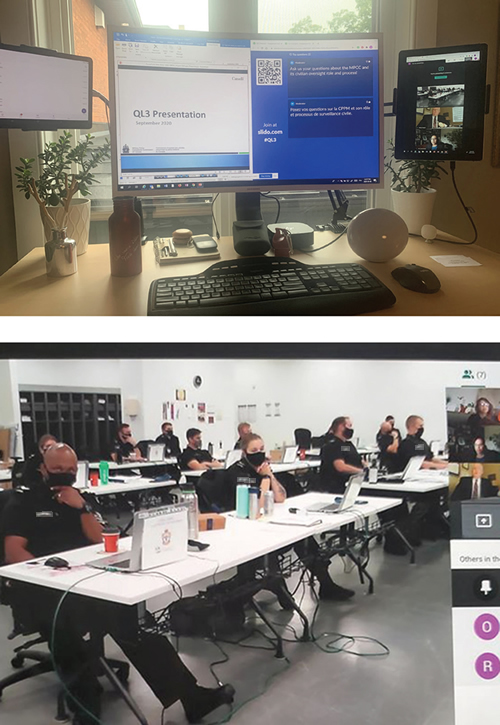
These annual visits to military locations across Canada increase awareness of the MPCC's mandate and activities, build relationships with stakeholders and provide an opportunity to respond to questions and concerns about the complaints process. The primary audiences are:
- members of the Military Police who may be subjects, complainants or witnesses in conduct or interference complaints;
- the military chain of command, which relies on the services of members of the Military Police to maintain military discipline, but cannot interfere with police investigations; and
- those who may interact with the Military Police because they live, work, or visit a CAF base. The MPCC's connection to this group is often made through the executive directors and staff of the Military Family Resource Centre (MFRC) at each base.
The MPCC's goal is to reach as many members of the military family as possible, while respecting the operational realities of CAF bases and wings across the country and abroad.
In the first quarter of 2020, the MPCC paused its outreach program to Canadian Armed Forces bases in response to the threat of COVID‑19. However, by the last quarter of the year, a pilot project to deliver virtual outreach session was launched with a first session at Canadian Forces Station St. John’s.
The feedback provided by participants who attended the pilot session was positive and will be used in the design and delivery of further virtual outreach sessions in the coming year.
Canadian Forces Military Police Academy (CFMPA)
In addition to visits to CAF bases throughout Canada, the MPCC delivers regular outreach sessions to the CFMPA located in Borden, Ontario. This fall, the Senior Director of Operations and General Counsel of the MPCC and Part-Time Commission Member Michel Seguin delivered a pilot virtual outreach session to the QL3 class. The success of the Pilot led to further virtual presentations to the Military Police Officer course (MPOC) class in Borden. In addition, the Chairperson and the Senior General Counsel and Director General were pleased to deliver an in person presentation to the CFNIS indoctrination course on November 20, 2020 in Cornwall, Ontario. The MPCC looks forward to continuing this interaction with the Military Police Academy and exploring how virtual outreach could become a complementary method of delivering outreach to the Military Police Academy.
Canadian Association for Civilian Oversight of Law Enforcement
The Canadian Association for Civilian Oversight of Law Enforcement (CACOLE ) is a national, non-profit organization of individuals and agencies dedicated to advancing the concept, principles and application of civilian oversight of law enforcement organizations across Canada and abroad. CACOLE is recognized worldwide for its policing oversight leadership. The MPCC’s Chairperson is a member of the CACOLE Board of Directors and the Secretary.
CACOLE ’s annual educational conference was postponed to 2021 due to the COVID‑19 pandemic.
VII – Collaboration
Throughout the year, the MPCC continued to work towards resolution of a number of complex and challenging matters with the National Defence leadership, the CFPM, the military chain of command and the Military Police community. This work is undertaken with a view to making the complaints process more efficient and effective.
Canadian Forces Provost Marshal
The MPCC Chairperson and the CFPM continued the practice of having twice annual meetings to discuss matters of mutual interest, including their core mandates and objectives. The first meeting took place on January 9, 2020 and the second meeting on October 15, 2020.These meetings provide an opportunity for the MPCC Chairperson, the CFPM, along with their respective key staff to discuss issues with respect to the complaints process and to find ways to improve the process. These meetings have been fruitful in ensuring strong lines of communication and a collaborative relationship. This has been reinforced by regular meetings between the MPCC Senior General Counsel and Director General and the Deputy Commander of the CF MP Gp / Office of PS. MPCC personnel have also engaged as needed with Professional Standards staff to maintain a professional yet collaborative relationship to address issues as they arise.

VIII – Coronavirus Pandemic and the Military Police Complaints Commission of Canada
On March 16, 2020, the MPCC closed its office to the public and transitioned all of its operations to a virtual environment. This section provides an overview of how this has impacted the organisation.
PEOPLE
MPCC employees already had experience and access to telework and flexible work arrangements to achieve work life balance. This greatly benefited the organisation, as employees were able to transition to a virtual office with negligible downtime. Flexible work schedules also allowed employees to perform their work and manage other aspects of their lives that were disrupted by the pandemic, with minimal use of special leave provisions.
Communication with all staff became a high priority for the organization. Information and updates were provided through weekly all staff meetings and individual conversations, as well as in writing. The MPCC, as a micro-organization, was able to take a very individualized approach right from the start and throughout the following months.
We productively engaged Unions early and often throughout this process to ensure that collective agreements were respected and staff had a number of options for communication and consideration of their concerns
The MPCC’s Executive Committee quickly realized that it would be important to maintain a social aspect to communications as well to encourage collaboration, teamwork and be aware of the strain on mental health of employees due to the extreme changes to our daily lives.
In addition, despite the limitations imposed by social distancing rules, managers developed new skills by on boarding new employees virtually and integrating them in the organisation.
TECHNOLOGY
Before the Pandemic began, the MPCC had initiated an information technology transformation project to implement Office 365. As such, we were able to accelerate the deployment of Microsoft Teams across the organisation. This new tool ensured people could collaborate productively in a virtual environment.
In addition, the organisation started deploying tablets supporting video conferencing to foster collaboration and communication among employees. These tools, processes and related training and support continued to be enhanced throughout the year as it became apparent that virtual collaboration would become the new norm.
INVESTIGATIVE WORK
Despite the upheaval caused by the Pandemic, the volume, quality and timeliness of work kept pace and even exceeded our pre-pandemic levels.
The changes imposed by the Pandemic required the MPCC to pivot rapidly to virtual work, which drove innovation in the organisation. For example, since the start of the Pandemic:
- Electronic review of documents and digital signatures are now the norm;
- Original records and evidence are now primarily electronic;
- Travel has been reduced to only most essential in-person interviews. Interviews were predominantly done by telephone until November at which time sufficiently secure technology became available to carry out video interviews;
- Key reports, such as interim and final reports, are now transmitted electronically.

WORKPLACE
Throughout the Pandemic, the MPCC has been adapting rapidly to the situation and implementing the recommendations and the guidance of the Public Health Agency of Canada, the Treasury Board Secretariat, the Office of the Chief Human Resource Officer, Public Service and Procurement Canada and Shared Services Canada.
In order to ensure the safety of employees accessing the workplace, the MPCC Implemented a Return to the Workplace Plan that includes four phases of progressive return to the workplace. The plan also included physical adjustments that have been implemented in the workplace in order to ensure physical distancing requirements are respected.
At the end of the year, the organization was still in Phase 1, which was initiated on October 13, with a greatly reduced number of staff allowed to access the workplace and the majority of employees working virtually.
Part 3 – Stewardship Excellence
I – Financial Management
In 2020, the MPCC continued to demonstrate sound management of its financial resources. It effectively planned, managed and controlled its budget and expenditures to meet operational and central agency requirements including timely and accurate financial reporting. In addition, the MPCC contracted the services of an audit firm to provide a risk based auditing plan for the next 5 years. The resulting Internal Control Management Framework was approved by the MPCC’s Executive Committee early in 2020, and the MPCC plans on submitting a request for proposals for this new 5‑year contract, with the hopes of starting the first audit in fiscal year 2020‑21.
The COVID‑19 pandemic presented some challenges to the MPCC, but with those challenges came opportunity. The MPCC was able to quickly adapt by digitizing its accounts payable processes. This has led to many benefits, including removing the need to collect and pay invoices from its physical office, using encrypted digital signatures on the invoices, as well as improving its document management and retention processes.
Operating Budget: The MPCC’s ongoing annual budget of $4.4M supports the delivery of the MPCC’s legislative mandate under Part IV of the NDA. This includes complaints investigation and resolution and all other activities to support central agencies’ requirements, and reporting to central agencies and Parliament (Departmental Plans, Departmental Results Reports, Annual Reports, Financial Statements and Quarterly Financial Reports).
In 2020, the MPCC’s budget was also restricted, due to delays in the full federal budget allocation. As a result, the MPCC only received 9/12ths of its funding for the period of April to December 2020, requiring the need to be particularly prudent in its spending.
Additional Financial Information: Additional financial information about the MPCC’s financial and expenditure management may be found in the Reports and Transparency Sections of the MPCC’s website under Departmental Plan, Departmental Results Report, Quarterly Financial Reports, Annual Financial Statements and Proactive Disclosures.
II – Digital Transformation

This year, the MPCC completed the planning, design and implementation of Office 365 across the organization. This proved particularly timely when COVID‑19 became a serious concern and we had to prepare for the possibility of expanded teleworking. A beta version of Microsoft Teams was quickly implemented to allow video/audio conferencing and chat capabilities among employees to foster collaboration. In addition, the number of external connections was temporarily increased to enhance performance and an additional secured remote solution was put in place to accommodate remote access for all employees. These measures were quickly implemented and ensured that the MPCC continued to operate at pre-COVID levels. In addition, Information Technology (IT) equipment to accommodate users and foster collaboration was quickly purchased and deployed.
By the end of the calendar year, the full implementation of the Government of Canada Security Guardrails on its Office 365 tenant for Office 365 Microsoft Teams and SharePoint Records Management was also completed. The user adoption to the new environment is progressing well and will continue in the New Year in a phased approach. In addition, the Government of Canada Secure Remote Access gateway was replaced to enhance performance and increase the capacity for more users to work virtually.
III – Mental Health and Wellness


The MPCC continued offering a variety of services to employees through an agreement with the Health Canada Employee Assistance Services to provide Informal Conflict Management Services including an Ombudsperson Service and an Employee Assistance Program. The MPCC also created a mental health and wellness Channel and resource page on its internal collaboration platform to share resources with employees and highlight key events such as the ‘Bell Let’s Talk Day’, Mental Health Week, the Mental Illness Awareness Week and the World Mental Health Day.
Finally, the MPCC’s Mental Wellness Champion, the Senior General Counsel & Director General continued to educate employees about mental health and well-being by offering two half day sessions: (1) Work-Life Balance and Resilience and (2) Managing Wellness in Uncertainty. Information on mental wellness was routinely shared with staff and they were encouraged to participate in events related to this topic. A selection of videos about mental health were presented at quarterly all-staff meetings as well as a presentation of the functionality of the LifeSpeak campaign, which provides mobile access at all times to a confidential, bilingual electronic learning platform for employees and their families.
IV – Inclusiveness

The challenges created by the pandemic did not diminish our commitment to develop an inclusive work environment where everyone feels supported and respected. Even as the work was done remotely the MPCC continued to create an accessible work environment by addressing barriers and proactively addressing accommodation requirements to allow for the full participation of its employees in the new virtual work environment.
To keep contact with colleagues in a more informal way, virtual coffee breaks have been a weekly event since the pandemic, which helped maintain healthy relationships and a collegial culture in the workplace. It was a way to exchange news and for employees to feel less isolated. The MPCC Social Committee also planned virtual activities to maintain this social cohesion. Yoga, online games over lunchtime and a weekly riddle competition are only few examples of the Social Committee’s initiatives.
MPCC employees used to gather in an informal and fun way to discuss and acknowledge events and awareness moments like the Diversity and Inclusion Campaign and Black History Month prior to the pandemic. Afterwards, the events and awareness days/months were promoted through various communication channels and virtual lunch and learn events. These included Asian Heritage Month, Islamic History Month, Gender Equality Week, Pride Month, Public Service Pride Week, Canadian Multiculturalism Day, National AccessAbility Week and Orange Shirt Day.
We pride ourselves on the level of diversity at the MPCC with 31% of employees having self-identified as members of an employment equity group.
Part 4 – Conclusion
Chairperson’s Conclusion
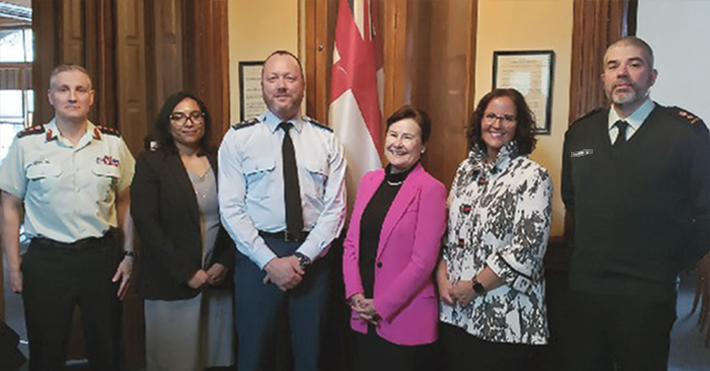
The year 2021 is shaping up to be another year of unprecedented challenges, but also opportunities. On November 16, 2020, the Minister of National Defence announced the Review Authority for the third independent review of the 1998 changes to the NDA, which include the legislative provisions establishing the MPCC and Military Police complaints process.
As with the previous independent reviews, the MPCC views this as an opportunity for renewal and intends to be a full participant in the process. As we have noted in the past, the MPCC’s limited authorities to gain access to information necessary to credibly and fairly resolve complaints has continued to fall behind the general trend of police oversight in Canada. Moreover, events over recent years, both in Canada and the United States, have exposed a gap between public expectations of police and police oversight and accountability on the one hand, and existing oversight regimes, on the other. The MPCC complaints process cannot afford to fall further behind the curve if it is to properly fulfill its mission of supporting public confidence in military policing through independent, credible and transparent oversight.
Towards this end, the MPCC has developed a series of important and forward-looking reforms to the Military Police complaints regime established in Part IV of the NDA aimed at bringing the MPCC’s authorities up to date.
The overwhelming thrust of the MPCC’s reform proposals seeks to expand the MPCC’s access to information needed to fairly and credibly resolve complaints. Quite simply, there are too many limitations on and exceptions to the MPCC’s ability to access relevant information. The MPCC proposes to extend its access to relevant information to all stages of the complaints process. It also seeks to ensure its ability to access relevant government information held outside the Military Police chain of command. At least as important, we seek to underscore that it is the MPCC’s perception of relevance, rather than the perception of the Military Police or that of their legal advisors, which is to govern.
Furthermore, there are certain categories of relevant information which are currently denied to the MPCC. These include legal advice sought by and provided to Military Police in relation to the actions that are the basis of the complaint, and potentially sensitive military information which may be highly relevant in those complaints arising from events during operational deployments.
In addition to improved access to relevant information, the MPCC’s proposals also aim to make the Military Police complaints process fairer and to improve timeliness. We propose that subject Military Police members, and not just dissatisfied complainants, be allowed to request a review by the MPCC of a conduct complaint, following initial disposition by the Canadian Forces Provost Marshal. The MPCC also seeks a time limit for requesting a review; a time limit for the provision of the Notice of Action; as well as the ability to screen out at the review stage frivolous complaints, or complaints better addressed through another redress process.
Taken together, we are confident that these changes to the Military Police complaints process will enhance the efficacy of that process and bring it more in line with the expectations and needs of the MPCC, the public and the Military Police themselves.
Hilary C. McCormack, LL.B.
Fellow Litigation Counsel of America
Chairperson
Our Organization
Biography of the Chairperson
Hilary C. McCormack, LL.B.
Chairperson

Hilary McCormack was appointed Chairperson of the Military Police Complaints Commission of Canada, effective October 5, 2015.
Prior to her appointment, Ms. McCormack was Director of Crown Operations (East Region) at the Ontario Ministry of the Attorney General, a position she had held since 2009. As Regional Crown Attorney, she supervised 10 Crown Attorney offices and was responsible for criminal prosecutions and summary conviction appeals in Eastern Ontario. In addition to her management duties, Ms. McCormack continued to prosecute many high profile and complex trials. She received the Ministry of the Attorney General Excelsior Deputy’s Award in 2010.
Ms. McCormack graduated from the University of Western Ontario’s law school. Following her call to the Ontario Bar in 1980, she was in private practice for three years before joining the Ontario Ministry of the Attorney General as Assistant Crown Attorney in 1983. She was seconded to the federal Department of Justice in 1992. Her work as General Counsel, Criminal Law and Policy, resulted in amendments to the Criminal Code which enhanced the general protection of women and children from sexual and physical violence for which she received the Department of Justice Deputy Minister’s Merit Award in 1994.
She returned to the Ontario Ministry of the Attorney General in 1994 where she continued to prosecute complex homicides and to develop her expertise in a number of criminal justice issues: child abuse, sexual assault and domestic violence; best practices in case management and trial processes and mental health. Over the course of her career, she travelled to Thailand and Kosovo to provide legislative and policy advice in these areas and frequently hosted many foreign delegations, including delegations from Russia, China, Afghanistan and the Palestinian Authority, on systemic issues and best practices.
Ms. McCormack prosecuted the first case in Canada to successfully use DNA evidence. She subsequently established an ad hoc committee to provide advice about the use of DNA evidence to Crown prosecution services and police services across Canada and internationally. She also worked on policy and legislative initiatives for both the DNA warrant provisions and the DNA data base which have transformed policing and prosecutions in Canada. This interest in facilitating transformative change also prompted her to implement a Drug Treatment Court, an Adult Mental Health Court and, for the first time in Canada, a Youth Mental Health Court while she was the Crown Attorney for Ottawa, an appointment she received in 2000, and the first woman to ever hold that position.
Between 2000 and 2005, Hilary McCormack was a member of the Department of National Defence’s Military Police Advisory Committee which provided advice to senior military leadership about significant changes to the military police and their investigative capacity. The committee’s recommendations improved the military police’s relationship with civilian courts and prosecution services, and provided opportunities for enhanced police training and education. In April 2016, she was formally inducted into the Litigation Counsel of America (LCA) at the LCA’s 2016 Spring Conference & Celebration of Fellows. She is a member of the International Commission of Jurists Canada.
Hilary McCormack has taught criminal law at the University of Ottawa, at the Bar Admission course, and served on the faculty of the Federation of Law Societies Criminal Law program. She is a frequent speaker at judicial, legal and police conferences, helped develop instructional material for the National Judicial Institute, and written and published extensively on various legal issues. She has served as a volunteer on the boards of directors and committees of not-for-profit organizations.
Biographies of the Commission Members
Michel Séguin (March 2014 – present)
Commission Member

Michel Séguin was appointed as a Commission Member March 6, 2014. He served as Interim Chairperson of the MPCC from March 28, 2015 to October 4, 2015.
Mr. Séguin has extensive operational policing experience, having spent 33 years with the Royal Canadian Mounted Police (RCMP). During his service with the RCMP, he held the position of Ethics and Integrity Advisor and adjudicated Code of Conduct hearings. Mr. Séguin retired from the RCMP in 2008 as Assistant Commissioner and the Commanding Officer of “O” Division (Ontario).
After his retirement from the RCMP, Mr. Séguin joined the House of Commons Administration as Director General, Parliamentary Accommodations Services, a post he held for five years.
Mr. Séguin was invested as an Officer of the Order of Merit of the Police Forces in May 2008 and a Serving Member of the Order of the Hospital of St John of Jerusalem in 2002. He is also the recipient of the Commemorative Medal for the 125th Anniversary of the Confederation of Canada, the Golden Jubilee Medal and the Royal Canadian Mounted Police Long Service Medal with Silver Clasp.
Mr. Séguin is an active member of the RCMP Veterans Association, the International Association of Chiefs of Police and is a Life Member of the Canadian Association of Chiefs of Police and the Ontario Association of Chiefs of Police.
Bonita Thornton (March 2018 – present)
Commission Member

Ms. Bonita Thornton was appointed as a Commission Member in March 2018. Ms. Thornton is a lawyer, adjudicator, manager and military veteran with extensive government and regulatory experience in administrative and criminal law. She is also a Board Member with the Health Professions Appeal and Review Board. Ms. Thornton previously led Investigations Departments at the Law Society of Ontario and the College of Physiotherapists of Ontario.
Ms. Thornton worked for twelve years as a lawyer and officer with the Office of the Judge Advocate General, Canadian Armed Forces. From 2006 until 2012, she held the position of Assistant Judge Advocate General, Central Region, where she oversaw five legal offices across Ontario and provided advice and training to military commanders, police and personnel on a broad spectrum of legal and operational issues. She was deployed to Afghanistan in 2008‑2009 as the senior legal advisor to the Canadian Task Force in Kandahar.
Ms. Thornton grew up in Northern Ontario, graduated from Laurentian University and has worked across the country. She graduated from Queen’s Law School in 1997 and was called to the Ontario Bar in 1999. Ms. Thornton has received the Queen Elizabeth II Golden Jubilee Medal, Queen Elizabeth II Diamond Jubilee Medal and 125th Anniversary of the Confederation of Canada Medal for her contributions to Canada and her community.
Ron Kuban, Ph.D. (May 2018 – present)
Commission Member

Dr. Ron Kuban was appointed as a Commission Member in May 2018. A graduate of the Royal Military College in Kingston, Ontario, he completed his M.Ed. and Ph.D. at the University of Alberta. For the last 50 years, he has been employed in the public sector of Canada and Alberta, and in his consulting company regarding emergency/crisis management.
Dr. Kuban has held numerous senior positions of responsibility, both paid and voluntary. The former includes service as a Commissioned Officer in the CAF, a Commissioner on the Edmonton Police Commission, a Member of the Parole Board of Canada and until recently as a Member of the Alberta Social Services Appeals Board.
Dr. Kuban volunteered for over 30 years on numerous Boards at local, provincial and national level, and was recognized for his service. Aside from his military medals, he was awarded the Queen’s Golden and Diamond Jubilee medals, as well as the Alberta Centennial Medal.
Organization chart
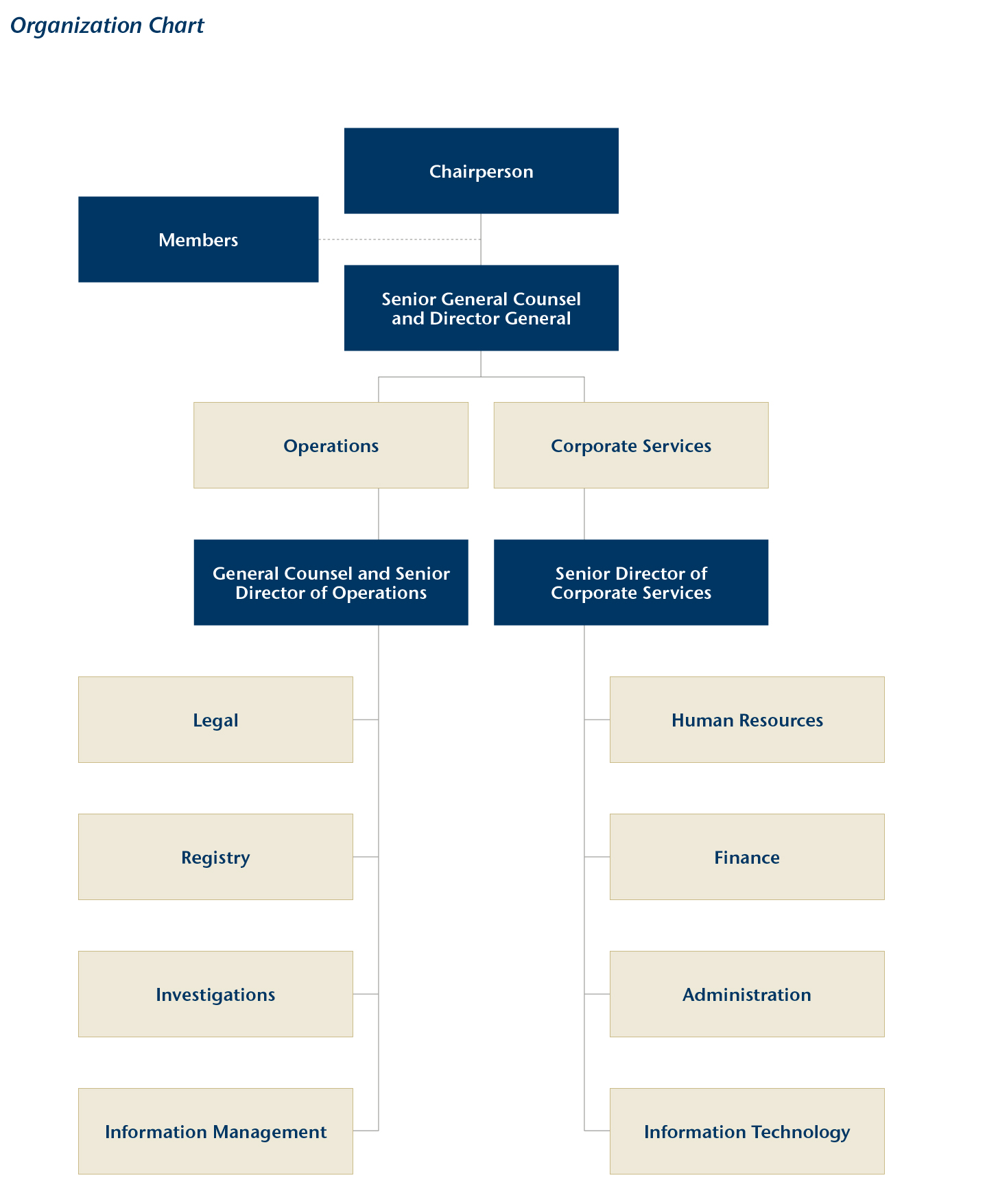
Alternate format
The image illustrates the Military Policy Complaints Commission of Canada's (MPCC) organizational structure, last updated in September 2016.
The chart is described from top to bottom starting with the highest position, being that of the Chairperson.
The Chairperson is linked to the Members, the General Counsel and Senior Director General of Operations and the Senior Director of Corporate Services.
The General Counsel and Senior Director General of Operations manages
- Legal
- Registry
- Investigators
- Information Management
The Senior Director of Corporate Services manages
- Human Resources
- Finance
- Administration
- Information Technology
How to Reach the Military Police Complaints Commission of Canada
Call our information line
613‑947‑5625 or toll-free at 1‑800‑632‑0566
Send us a fax
613‑947‑5713 or toll-free at 1‑877‑947‑5713
Send us a letter
Military Police Complaints Commission of Canada
270 Albert Street, 10th floor,
Ottawa, ON K1P 5G8
Contact us for a private consultation.
Send us an email
Note: We cannot guarantee the security of electronic communications.
Visit our website
Follow us on Twitter
Follow us on LinkedIn
@MPCC-Canada (bilingual account)
Like us on Facebook
- Date modified:

